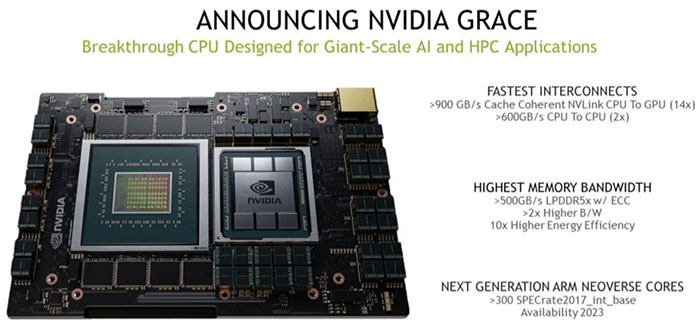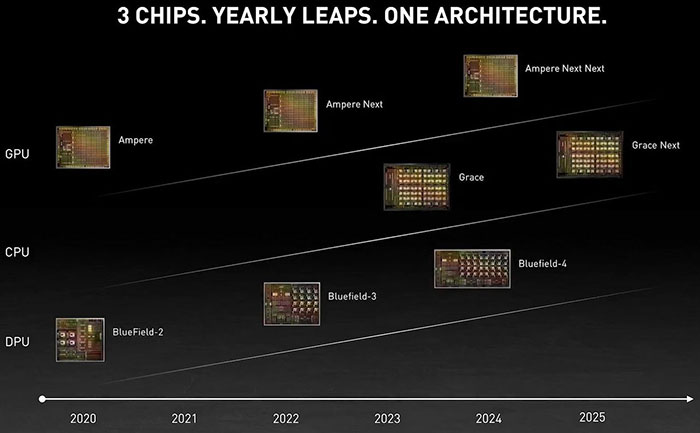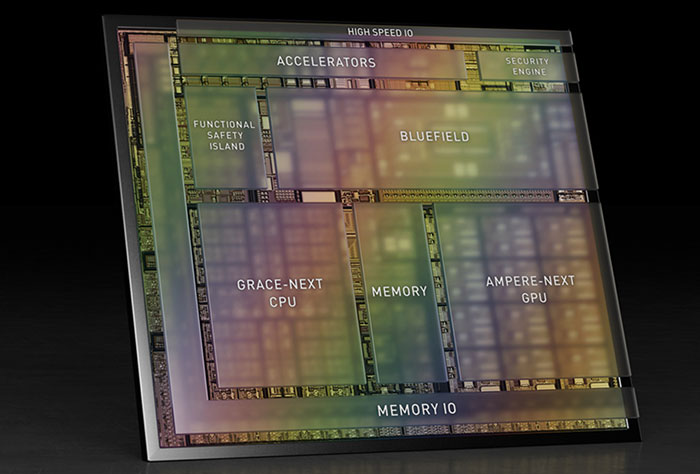At GTC21 Nvidia has announced its first data centre CPU. Dubbed 'Grace', in honour of US computer pioneer Grace Hopper, the new processor is Arm-based and designed to tackle the most complex AI and HPC workloads. In its targeted tasks Nvidia claims Grace "will deliver 10x the performance of today’s fastest servers," when tightly coupled with Nvidia GPUs.
Nvidia is now a three chip company
"Leading-edge AI and data science are pushing today’s computer architecture beyond its limits – processing unthinkable amounts of data," Nvidia CEO Jensen Huang. "Using licensed Arm IP, Nvidia has designed Grace as a CPU specifically for giant-scale AI and HPC. Coupled with the GPU and DPU, Grace gives us the third foundational technology for computing, and the ability to re-architect the data centre to advance AI. Nvidia is now a three-chip company."
In the statement above you may have noticed the reference to 'giant-scale' computing. By focusing on this type of computing it seems that Nvidia has found a worthwhile advantage. Nvidia has found that in workloads such as training next-generation NLP models that have more than 1 trillion parameters a Grace CPU and Nvidia GPU system can be 10x faster than a state-of-the-art Nvidia DGX system which uses an x86 processor.

Other technologies key to accelerated systems powered by Grace include; NVLink to provide a 900GB/s connection between Grace and NVIDIA GPUs (up to 30x the bandwidth of rival servers), a LPDDR5x memory subsystem for speed and efficiency, unified cache coherence, HBM GPU memory.
Two supercomputer labs are already planning to adopt Grace. Both the Swiss National Supercomputing Centre and Los Alamos National Laboratory plan to intro HPE made Grace powered supercomputers in 2023.
Other major GTC day-one announcements
A roadmap of sorts outlining yearly leaps of GPU, CPU and DPU (Data Processing Unit) leaps was revealed yesterday by Nvidia. Between now and 2025 Nvidia plans to refresh Ampere GPUs twice, Bluefield DPUs twice, and intro a second gen Grace CPU. Hopefully it will come up with better names than 'Ampere Next Next' before launch dates.

Nvidia has outlined its "data centre on wheels" – the Drive Atlan autonomous vehicle platform. As you can see from the main image this platform is going to centre on an SoC using Nvidia's newest next gen technologies.

A 4x generational performance improvement is promised with Atlan, and it is claimed to deliver 1,000 TOPS with its Grace-Next CPU, Ampere-Next GPU, Bluefield DPU, other accelerators and high speed I/O. Expect Atlan to sample in 2023, destined for vehicles hitting the roads in 2025.
Nvidia announced eight new Ampere architecture GPUs for designers, architects and engineers. For desktops, the new Nvidia RTX A5000 and RTX A4000 GPUs feature new RT Cores, Tensor Cores and CUDA cores to speed AI, graphics and real-time rendering "up to 2x faster than previous generations". Similarly, Nvidia has prepared the new RTX A2000, RTX A3000, RTX A4000 and RTX A5000 laptop GPUs. Lastly, for data centre based virtualisation there are the new Nvidia A10 GPU and A16 GPUs. These data centre GPUs are claimed to deliver up to 2.5x the virtual workstation performance and up to 2x user density with lower TCO.






